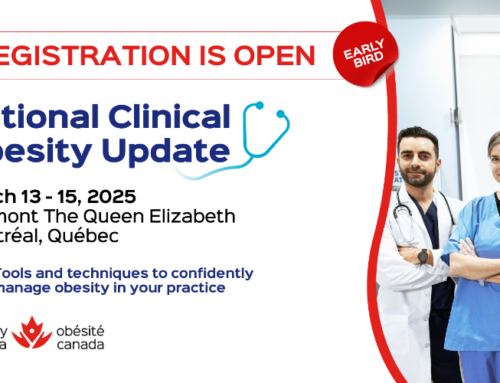Today’s blog post is brought to you by Ian Patton, Director of Advocacy and Public Engagement for Obesity Canada
The publication of new Clinical Practice Guidelines for obesity in 2020 has shifted the narrative around obesity in Canada and highlighted the fact that obesity is a chronic disease. Based on the evidence, the guidelines define obesity as a complex, progressive, relapsing chronic disease where excess or abnormal adipose tissue (fat) impairs health. It is a disease that negatively impacts millions of Canadians physically, mentally, and socially.
The guidelines outline the evidence-based recommendations on how to effectively manage the disease with the three pillars of obesity management which includes, cognitive behavioral therapy, pharmacotherapy, and bariatric surgery which all support effective behavioural modifications to promote optimal health. Each of these treatments works to support the individual living with obesity to overcome the biological, physiological and psychological drivers of the disease and lead to improved health and quality of life.
While we have the guidelines to point to as a “best practice” for obesity management, we also know that, while these options are AVAILABLE, this does not mean they are ACCESSIBLE. The Report Card on Access to Treatment for Obesity shows us that these treatments are woefully inaccessible across the country considering how prevalent the disease is and the impact it has on our population.
As part of our mission, Obesity Canada is always working to improve access to ALL evidence-based obesity treatments. Right now we are looking to collect information from individuals living with obesity on their experiences with obesity treatments. Specifically we would like to hear from individuals who have had any experience with prescription obesity medications.
Health Canada recently approved a new medication, Semaglutide (brand name Wegovy), as an effective treatment for obesity. We are interested in gaining insights and perspectives of individuals who have had experience with obesity medications. We are asking individuals to complete this short survey. All survey responses will be confidential and anonymous. We will use this information to help inform our advocacy efforts and better understand lived experiences. We will also be using this data to prepare a patient submission to the Canadian Association for Drugs and Technologies in Health (CADTH) as part of their Drug Reimbursement Review process. CADTH is the Canadian agency that is responsible for reviewing medications and making recommendations on if that medication should be covered under provincial, territorial and federal drug plans.
By collecting a wide variety of lived experiences and input from Canadians living with obesity, Obesity Canada’s patient submission to CADTH can help ensure a complete and informed decision is made, leading to appropriate recommendations.
To complete the survey please follow this link and feel free to share with anyone you know who this may be relevant for.
Should you have any questions about this survey, please contact Ian Patton at patton@obesitynetwork.ca






